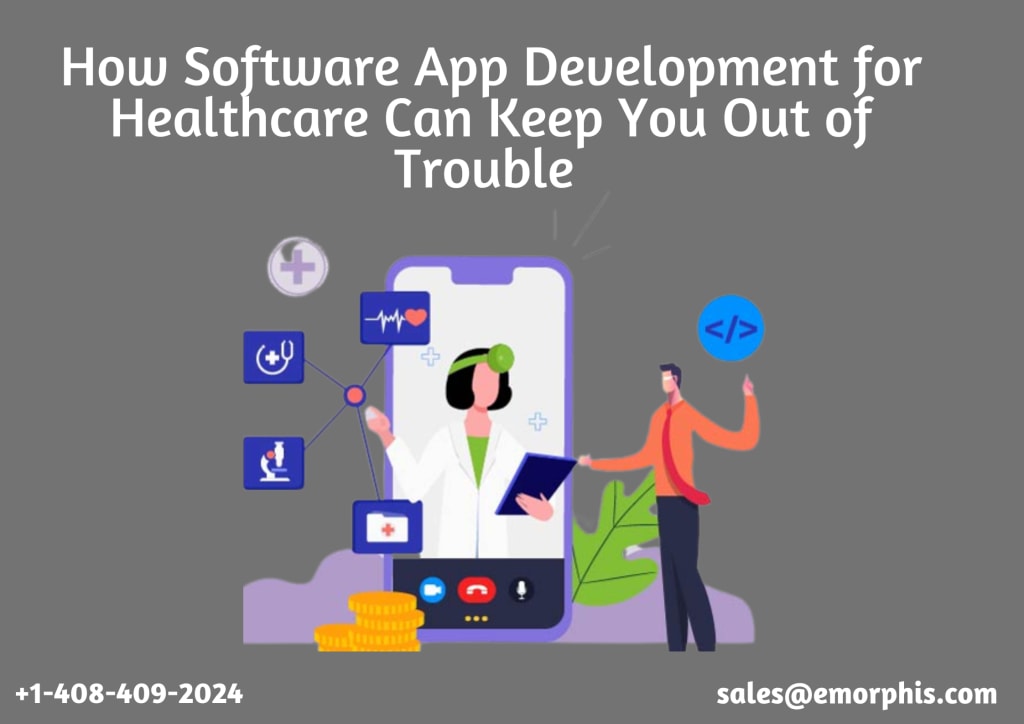How Software App Development for Healthcare Can Keep You Out of Trouble
healthcare software application development

Understanding the Risks of Healthcare App Development:
Developing software applications for the healthcare industry comes with a unique set of risks and challenges that developers must understand and address to avoid negative consequences. These risks include potential legal and financial liabilities, reputational damage, and harm to patients or users. Understanding these risks is the first step in developing healthcare apps that are safe, reliable, and effective.
Some of the key risks of healthcare app development include the following:
Compliance: Healthcare apps must comply with strict regulations and standards to protect patient privacy and ensure data security. Failure to comply with these regulations can result in significant penalties and legal consequences.
Data security: Healthcare apps must securely handle sensitive patient data to prevent unauthorized access, hacking, or data breaches. Failure to do so can result in significant reputational damage and legal liabilities.
Patient safety: Healthcare apps must be designed with patient safety in mind to avoid harm to patients or users. Failure to consider patient safety can result in negative health outcomes and legal liabilities.
Technical issues: Healthcare apps must be reliable, stable, and functional to ensure they work as intended. Technical issues, bugs, or glitches can have serious consequences for patient health and user satisfaction.
User education: Healthcare apps must be designed with user education in mind to ensure that users understand how to use the app safely and effectively. Failure to educate users can result in negative health outcomes and legal liabilities.
The Importance of Regulatory Compliance in Healthcare App Development:
Regulatory compliance is a critical consideration in the development of healthcare apps. Healthcare apps are subject to a range of regulations and standards, including those related to data privacy, security, and patient safety. Failure to comply with these regulations can result in serious legal and financial consequences for developers, healthcare providers, and patients alike.
Some of the key regulations and standards that healthcare apps must comply with include:
HIPAA: The Health Insurance Portability and Accountability Act (HIPAA) sets national standards for protecting the privacy and security of personal health information (PHI). Healthcare apps must comply with HIPAA regulations to protect patient privacy and ensure the security of PHI.
FDA regulations: The US Food and Drug Administration (FDA) regulates medical devices, including software applications that are considered medical devices. Healthcare apps that meet the definition of a medical device must comply with FDA regulations, which include pre-market approval, post-market surveillance, and other requirements.
GDPR: The General Data Protection Regulation (GDPR) is a regulation in the European Union (EU) that sets standards for data privacy and protection. Healthcare apps that collect, store, or process data on EU citizens must comply with GDPR regulations.
ISO standards: The International Organization for Standardization (ISO) has developed a range of standards for healthcare information technology (HIT) systems. Healthcare apps can use these standards as a framework for ensuring compliance with regulations and best practices.
Protecting Patient Data in Healthcare App Development:
Protecting patient data is a critical consideration in the healthcare app development. Healthcare apps often collect, store, and process sensitive patient data, including personal health information (PHI) and other sensitive data. Failure to protect this data can result in serious legal and financial consequences for developers, healthcare providers, and patients alike.
Some best practices for protecting patient data in healthcare app development include:
Encryption: Healthcare apps should use encryption to protect data both in transit and at rest. Encryption can help ensure that sensitive data remains confidential and is not accessible to unauthorized parties.
Access controls: Healthcare apps should implement access controls to ensure that only authorized personnel can access sensitive patient data. Access controls can include things like passwords, biometric authentication, and two-factor authentication.
Data minimization: Healthcare apps should only collect and store the data that is necessary to provide the service. Collecting and storing unnecessary data increases the risk of a data breach and can result in legal and financial liabilities.
Regular security audits: Healthcare apps should undergo regular security audits to identify vulnerabilities and address them proactively. Security audits can help developers stay up to date with the latest security threats and best practices.
Secure data transmission: Healthcare apps should use secure data transmission protocols, such as SSL/TLS, to ensure that data is transmitted securely between the app and the server. Secure data transmission can help prevent data breaches and unauthorized access to sensitive patient data.
Best Practices for Healthcare App Development to Avoid Legal Issues:
Developing a healthcare app requires a thorough understanding of the legal and regulatory frameworks that govern the healthcare industry. The following best practices can help you avoid legal issues during the development of a healthcare app:
Compliance with healthcare regulations: Ensure that your app complies with the relevant healthcare regulations such as HIPAA (Health Insurance Portability and Accountability Act), FDA (Food and Drug Administration), and GDPR (General Data Protection Regulation) if applicable. These regulations are in place to protect patients' privacy and data.
Secure data storage and transmission: Your app should store and transmit data securely. Encryption and two-factor authentication can help prevent unauthorized access.
Informed consent: Obtain informed consent from patients before collecting or using their health data. Users must be fully informed about the data collection, storage, and sharing practices of the app.
Appropriate data usage: Ensure that you collect and use only the minimum amount of data necessary for your app's functionality. Avoid collecting data that is not relevant or necessary for your app's purposes.
Conclusion
Developing software for healthcare apps is a complex and challenging task that requires a meticulous approach. Developers must ensure that the app is compliant with regulatory requirements, has robust security measures, and is user-friendly. Conducting thorough testing and quality assurance can also help to mitigate potential problems. By following these best practices, software development for healthcare apps can keep you out of trouble and ensure that the app delivers the intended benefits to patients and healthcare providers.
About the Creator
Larisa Albanians
Hey, a healthcare technology solutions provider at emorphis, that is helping organizations to deliver better healthcare solutions.






Comments
There are no comments for this story
Be the first to respond and start the conversation.